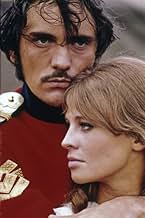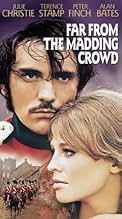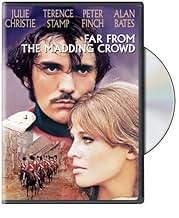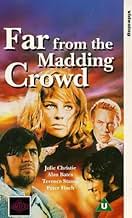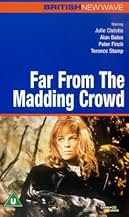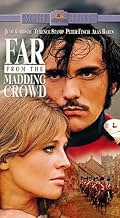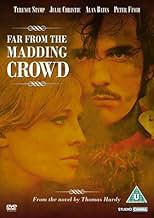IMDb RATING
7.2/10
6.4K
YOUR RATING
Bathsheba Everdene, a willful, flirtatious young woman, unexpectedly inherits a large farm and is romantically pursued by three very different men.Bathsheba Everdene, a willful, flirtatious young woman, unexpectedly inherits a large farm and is romantically pursued by three very different men.Bathsheba Everdene, a willful, flirtatious young woman, unexpectedly inherits a large farm and is romantically pursued by three very different men.
- Nominated for 1 Oscar
- 3 wins & 7 nominations total
- Director
- Writers
- All cast & crew
- Production, box office & more at IMDbPro
Storyline
Did you know
- TriviaThe problem from which the sheep were suffering when they broke out into the green field, is called "pasture bloat". They got into a field with immature legumes, such as alfalfa or clover. The food causes excessive gas production which inflates the sheeps' stomachs (rumen) and compresses their lungs so they can't breathe. Using a trocar to puncture the rumen and release the gas, as Gabriel did, is a lot messier than this film shows.
- GoofsThe Valentine's Day greeting card that Bathsheba sends to Mr. Boldwood is of a contemporary 1960s style.
- Quotes
Bathsheba Everdene: [to her workers] Don't anyone suppose that because I'm a woman, I don't understand the difference between bad goings-on and good. I shall be up before you're awake, I shall be afield before you're up, and I shall have breakfasted before you're afield. In short, I shall astonish you all.
- Alternate versionsFor the UK version, a cockfight had to be deleted to comply with that country's laws on animal cruelty on film, as stated in the Cinematograph Films (Animals) Act 1937.
- ConnectionsEdited into Soylent Green (1973)
Featured review
I have never read a good word about this film in any movie guide, which frankly baffles me. I think it's a masterpiece, and despite Hardy being one of my favourite authors, I think this is actually better than the novel. It also contains two absolutely perfect moments. But first some general comments. The photography is gorgeous, actually looking more realistic than idyllic, beautiful but sometimes cold and forboding, brooding over the tragic proceedings. Secondly, the remarkable soundtrack by Richard Rodney Bennett lends the movie a good deal of its emotiveness. The use of English folk songs to comment on the proceedings is ingenious, sometimes impressively reflective of the situations, and at points extremely unsettling.
Julie Christie is beautiful and I found her Bathsheba the precise mixture of headstrong independence and vulnerability. Terence Stamp's repulsive Troy is a triumph of casting and Alan Bates is wonderful as the simpliest of her suitors. The film is stolen for me though by Peter Finch, who begins a hat trick of devastating performances, here, in The Trials of Oscar Wilde and Sunday Bloody Sunday. His Boldwood is a remarkable creation, so eligible, so tragic, so lost and helpless. His scene with Bathsheba when she suggests Christmas to be a time when she will make a decision on their future is heartbreaking. "Christmas," he smiles. "I'm happier now." But the scene that should surely secure this movie a place in film history is that in the graveyard. Without spoling the plot for those who have yet to see it, the gargoyle spewing rainwater over the graves as the sound of "The Bold Grenadier" plays is as affecting an image as one is ever likely to see on screen. The Boldwood plot has a darker outcome here than in the book, which I'm sure Hardy would have approved of. This is a beautiful and disturbing movie that does not shy away from Hardy's bleak view of existence, and adds to the mix a strong sense of gritty 60s honesty. Beautiful, devastating and unforgettable.
Julie Christie is beautiful and I found her Bathsheba the precise mixture of headstrong independence and vulnerability. Terence Stamp's repulsive Troy is a triumph of casting and Alan Bates is wonderful as the simpliest of her suitors. The film is stolen for me though by Peter Finch, who begins a hat trick of devastating performances, here, in The Trials of Oscar Wilde and Sunday Bloody Sunday. His Boldwood is a remarkable creation, so eligible, so tragic, so lost and helpless. His scene with Bathsheba when she suggests Christmas to be a time when she will make a decision on their future is heartbreaking. "Christmas," he smiles. "I'm happier now." But the scene that should surely secure this movie a place in film history is that in the graveyard. Without spoling the plot for those who have yet to see it, the gargoyle spewing rainwater over the graves as the sound of "The Bold Grenadier" plays is as affecting an image as one is ever likely to see on screen. The Boldwood plot has a darker outcome here than in the book, which I'm sure Hardy would have approved of. This is a beautiful and disturbing movie that does not shy away from Hardy's bleak view of existence, and adds to the mix a strong sense of gritty 60s honesty. Beautiful, devastating and unforgettable.
- How long is Far from the Madding Crowd?Powered by Alexa
Details
- Release date
- Country of origin
- Language
- Also known as
- Die Herrin von Thornhill
- Filming locations
- Production companies
- See more company credits at IMDbPro
Box office
- Budget
- $2,750,000 (estimated)
- Runtime2 hours 48 minutes
- Color
- Aspect ratio
- 2.35 : 1
Contribute to this page
Suggest an edit or add missing content

Top Gap
By what name was Far from the Madding Crowd (1967) officially released in India in English?
Answer

